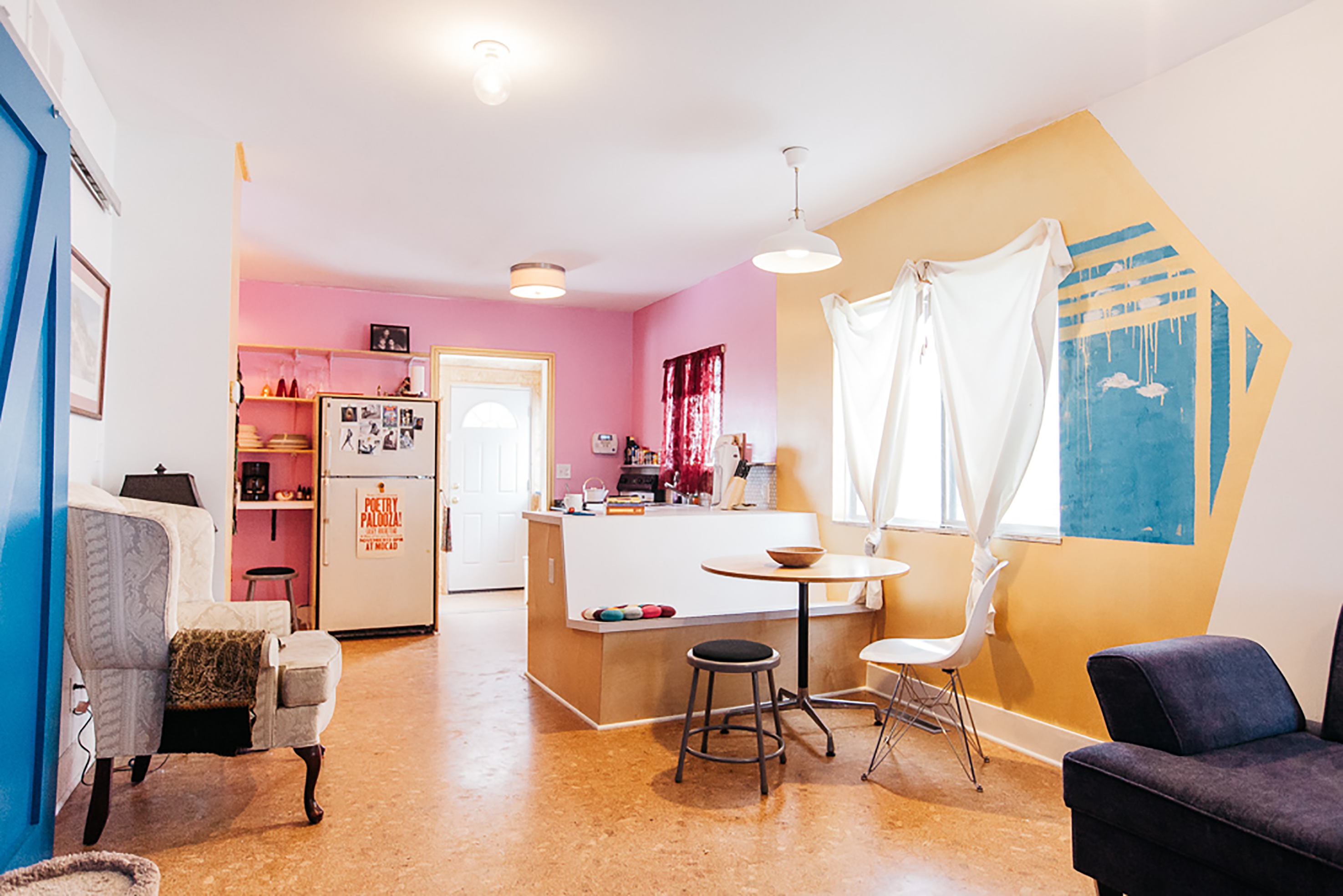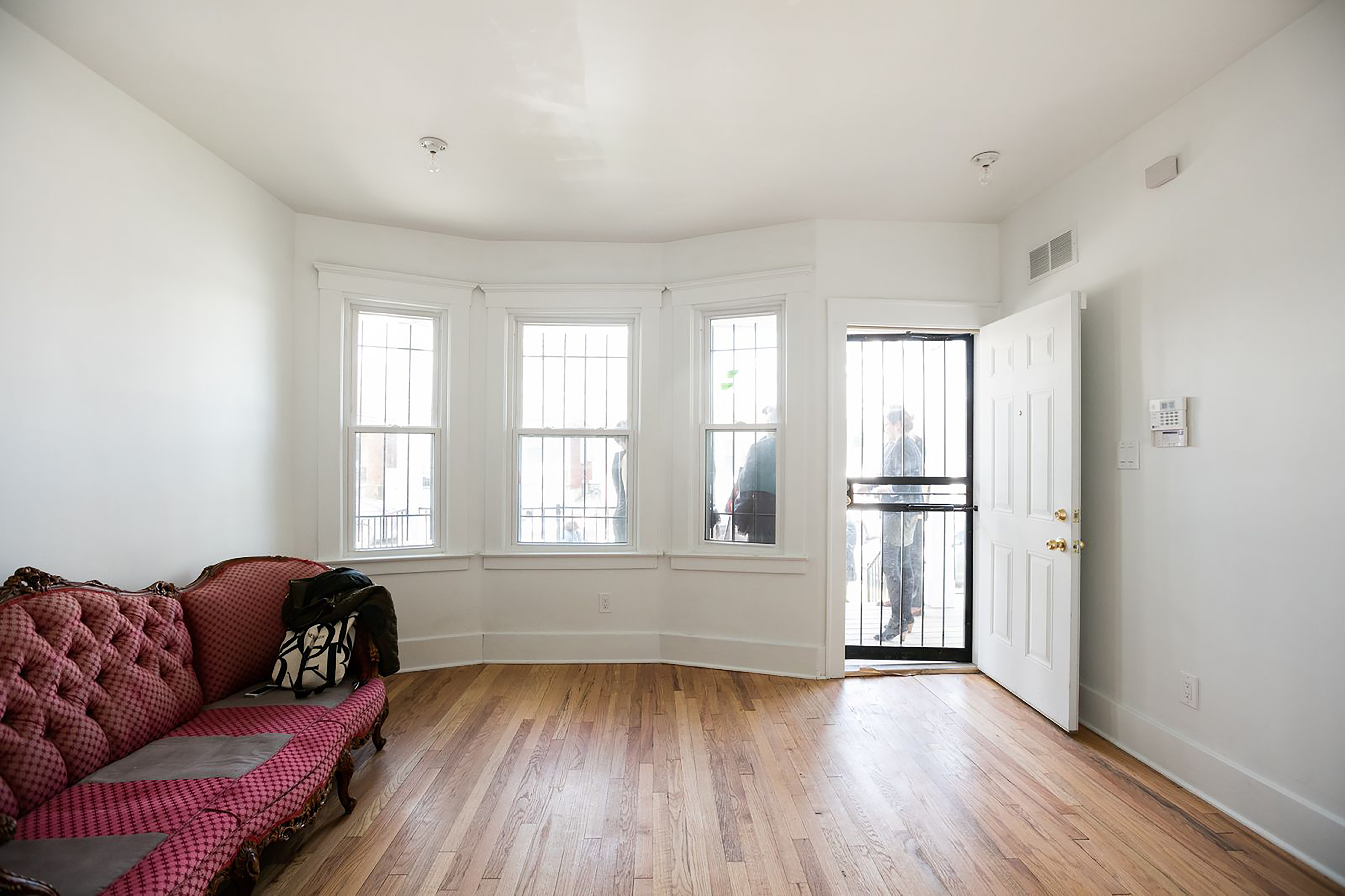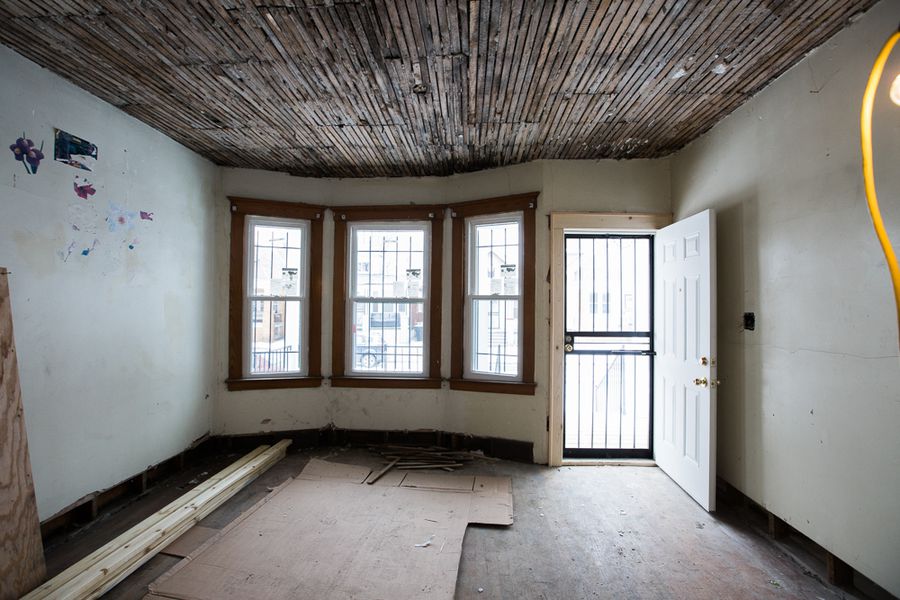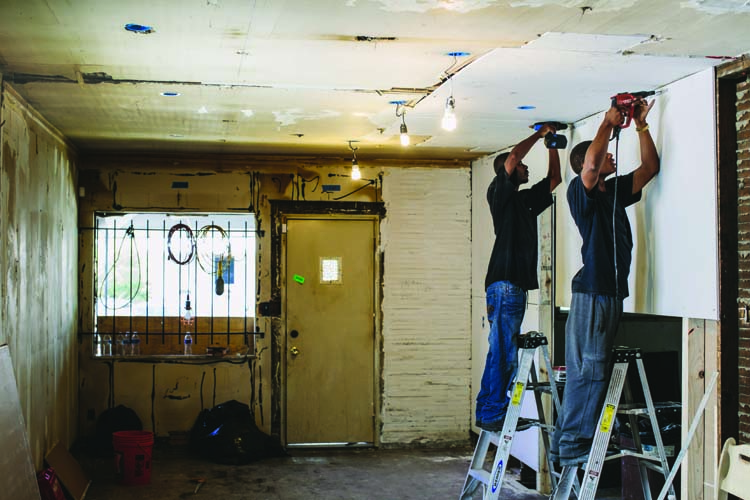Write-A-House Transforms Vacant Homes and Builds Community

Under warm lamplight and up creaking, wooden stairs they trickle in, the heavy and unassuming door closing behind, closing out the stinging cold on Farnsworth St. in Detroit’s Midtown neighborhood. They climb to the second floor, over decorative rugs and timeworn hardwood floors for the comfort and kinship to be found by a crackling fire. Their only cargo are words, tucked in woolen pockets on paper sheets and leather journals, they’re typed into Macbooks, penned on hearts, cemented into memory. They are writers: storytellers, poets, comics, wielders of language and imagery. They’ve come to speak the words aloud, to watch them take shape and catch flight in audible expression. They’ve come to listen to the hearts of strangers, to unburden, to laugh, to mend a little, to be inspired. To offer their portion, written in solidarity, its power multiplied in community.
Nestled across the street from the Detroit Institute of Arts, the Scarab Club has been fostering evenings like these for over 100 years. Founded by many of the city’s prominent artists at the cusp of Detroit’s auto boom, it remains today, committed “to the cultivation and celebration of the visual, literary and performing arts in Detroit.” Tonight the club partners with an organization called Write A House, a unique community arts non-profit whose monthly reading series, “Literally,” connects readers and writers in the city, kindling the joy of and devotion to the written word. Hosted by Write A House winner and cultural critic Anne Elizabeth Moore, “literally” welcomes local, national and international writers and performers to share longer works in a relaxed setting. Tonight is called “RESOLVED,” and guests casually sip glasses of wine while they laugh and sigh over the bliss and bullshit of making New Year’s Resolutions.
Write A House, founded in 2012 by Sarah F. Cox and Toby Barlow, developed a holistic approach to rebuilding communities in Detroit by supporting the arts, housing redevelopment, and jobs. Cox, now director of the organization, says the idea came with the recognition that Detroit had been long well-known for both its visual arts and innovative music scene, yet the literary community had not yet developed a strong presence in the city. She and Barlow had an awareness of literary communities or artists-in-residence elsewhere and they wondered what that could look like in Detroit. At the time, moving here was a novel idea, Cox says. The question was, could they attract talented writers to become a part of the city’s unique and fascinating narrative, and if so, how?
With a background in real estate, Cox, founding editor of Curbed Detroit, says she moved to the city herself in 2011, “because there were compelling stories that I felt no one else was telling in the way I wanted.” She sensed the city needed honest depictions of the real people living and working in its communities, in the midst of very real challenges. Instead there were ongoing, nationwide illustrations of desolation and desertion. Dystopian tales written by casual observers about a city where life used to happen.
As both writers and urban activists, Cox and Barlow began to connect their desire for fresh perspective on the city and their motivation to strengthen and preserve its communities. Write A House Vice-President Francis Grunow says this is where he and others joined the conversation. “I just thought it was such a unique intersection of need in the community for addressing blight and vacancy and helping to build and support a literary community. I’ve not been involved with a project that has sort of been able to tap into something so deep into public imagination. People like the idea and it’s very easy to relate to.” Grunow says the group chose to launch the effort in the BanglaTown neighborhood, on the northern border of Detroit and Hamtramck for several reasons. The diverse community which included Bangladeshi Americans, African Americans and Eastern Europeans already had a strong artist community presence, but it also suffered from the foreclosure and vacancy crisis, like elsewhere in metro Detroit. Artist couple Mitch Cope and Gina Reichert had begun to combat this issue with a neighborhood sustainability project called Power House, attracting nationwide attention by turning vacant houses into art and design projects and utilizing abandoned spaces to celebrate multicultural visual and performing arts.
Here, Write A House believed they could also play a role in strengthening community and so began the process of renovating empty houses to become writer residencies. “What was super exciting at the time is I really had no idea what would happen next,” Cox writes on the organization’s blog, “if anyone would give us any money, if anyone would apply, and if they did, would they get here, realize this town was nuts, and storm out in two months,” Yet, over the next few months they were surprisingly overwhelmed with applications and donations. The writing community and those who appreciated it were indeed out there.
“The idea is very compelling but the reality of doing it is quite challenging,” admits Grunow. “It’s kind of a typical Detroit story, where people have great ideas for solving all sorts of Detroit issues, but when the rubber meets the road it can easily get very challenging. We spent probably a year trying to figure out how we could do it legally.” The short version to that—a writing contest hosted by the organization would select a winner of the house. The winning artist would come to live in the house under a 2-year lease. The artist pays taxes and utilities—all non-mortgage costs. At the end of two years, if they’re still there, they are given the deed to the property and are the proud owners of a Detroit home in a vibrant and flourishing community.
Grunow explains some of the challenges: “There are a lot of behind the scenes challenges to get it worked up from a legal point but then from a practical point of view there are also challenges because when houses become available you can’t always anticipate that. You can’t say Ok, that’s the house, we can definitely get that. You can’t ever get too tied to any real estate decision.”
Grunow outlines the process for acquiring these houses: “We were very intentional about not wanting to buy occupied houses. We wanted to sort of divert houses out of the demolition pipeline. To get them at a place where they had been lost to foreclosure and were vacant. There were some tools coming online at that point, like the land bank (Detroit Land Bank Authority). That’s all to say, acquiring the houses is a process, and then raising the money to renovate the houses is a process.”
Grunow describes how they had a good push initially, raising about $30,000 in crowdfunding and attracting the support of foundations such as The Knight Foundation, the Hudson Webber Foundation and Team Detroit (now Global Team Blue) - the major ad firm for the Ford Motor Company. “We didn’t know what it would cost to renovate one of these houses,” Grunow says. These houses come (from auction) usually stripped of everything. We wanted to give what we sort of determined was an eighty percent done house. We wouldn’t do some of the aesthetic, nor did we really want to. We didn’t want these houses to necessarily stand out from their neighbors house, but we did want to give the writers new HVAC, upgrade all the internal—new kitchen, new bath, new plumbing and fix the electrical.”
As work continued on the first houses under a general contractor, Grunow says the organization began to ask themselves how they could improve that aspect of the program to provide more meaningful training. To that end, an apprentice program was formed through a partnership with Detroiters Working for Environmental Justice, a group committed to training builders in quality craftsmanship and sustainable building practices. Through the DWEJ construction company, Future Build, locals gain real-world experience to help launch careers in construction trades. Under this partnership, Write A House was able to realize their commitment to community redevelopment and job opportunity as well as trades education. All they needed now were the writers.
A prestigious panel of judges was assembled, including former National Poet Laureate Billy Collins, Detroit writer and filmmaker Dream Hampton, and award-winning poet and professor, Major Jackson. Applicants were encouraged from across the globe. One criteria for winning a house was that the artist needed to be considered low-income. “Writers don’t make a lot of money,” Grunow states. “Part of the intent of this program was to give people a chance to make a living writing. We actually looked at HUD standards for income as part of the review of the applications.”
In 2014, inaugural winner, poet, and “sea witch” from Cape Cod, Casey Rocheteau moved into the first house. Along with serving on the Write A House board of directors to help organize and fundraise for other artists, she currently works as an Artist in Residence at InsideOut Literary Arts Project, mentoring Detroit youth in their growth of expression through poetry, stories and artwork. Rocheteau’s second poetry collection was published by Sibling Rivalry Press in 2016.
2015 winner, journalist adventurer Liana Aghajanian, described as “raised in Los Angeles by way of Tehran” specializes in long-form, narrative storytelling from Mongolia to Kenya to Hamtramck and Detroit. Her illustration of under-reported communities across the globe, primarily subcultural and marginalized, and how they are affected by their leaders and policies has appeared in several national and international publications. “Nothing can ever prepare you for being told that you’ve just won a house,” Aghajanian writes. “Nothing ever prepares you for moving to Detroit, either. It is not the kind of place you can understand from afar.”
Chicago based renowned author, journalist, comic anthologist and cultural critic Anne Elizabeth Moore joined the BanglaTown neighborhood in 2016. “Literally, A Reading Series” was a creation of Moore, who hosted it in her Detroit home until it relocated last November to the Scarab Club. “Anne was the last person to win a house and the first person to open her house,” admires Nandi Comer, Detroit poet and fourth Write A House winner.
Comer continues, “She brings a unique energy that wasn’t here before. I’ve never experienced the public presence of nonfiction, fiction and comic together in the literary world. She’s bringing opportunities to writers.”
Write A House had planned to bestow a fourth renovated house to Comer, the first local award recipient. Unfortunately, the funding to complete the project did not come through as they had hoped. Several factors would force a hard conversation about how to rethink the process in which they could sustain support for the literary residence program.
“The market has changed,” says Grunow. “There’s more competition and there’s more stress on that being a need, offering affordable housing just generally (in Detroit). Before, there was a lot of housing available; it was almost like hemorrhaging of housing, and while it’s far from perfect, the market has stabilized somewhat and its harder to be strategic about acquiring these houses in the same way. Gentrification and income are a part of that equation now in a way that they may not have been five years ago.”
Grunow says that although they want to continue to attract writers to come to Detroit, it’s also very important to the organization to retain local people, artists like Nandi Comer, and give them opportunities to stay here if they want to so they’re not forced out because market prices rise. “We moved neighborhoods because that sort of pipeline had dried out in terms of houses that we could take on. And that’s good. We have housing in the North End that we are trying to figure out. The fourth house still has ways to go. We’ve done the initial big clean out, we have a donated kitchen ready to go, we’ve replaced windows and doors. I’d say we are a third of the way there in terms of cost,” Grunow surmises. Write A House is dependent on donors. “We had acquired the house,” Grunow says. “We had started work on it, and we had a number of these requests in and they didn’t come back.”
The valuable feedback they received from funders is helping them re-imagine how they do artist residencies. The concept of giving a house away is exciting and compelling but ultimately, not sustainable. In 2016, Write A House began to rewrite its mission “to keep up with the changing pace of development and to be the first development company of its kind to address artist housing, vacancy, and gentrification in advance, as a holistic package of solutions.” In the meantime, they are committed to supporting their 4th winner and are in conversation with her about how best to do that.
Nandi Comer’s raw and stirring poetry wins the popular vote from listeners, including me, at the Scarab Club. She shares afterward that she is excited about the upcoming publication of her chapbook, “American Family: A Syndrome.” Also an Artist in Residence at InsideOut Literary Arts Project, she is the Administrative Associate and Bookings Manager at Allied Media Projects, serving a network of media makers, artists, educators, and technologists working for social justice.
“It’s been our hardest and our most rewarding year,” Cox states in the December Write A House blog. Though the organization is behind in a promise and had to move at a humbling pace this year, Cox says individual giving is higher than ever and their team has strengthened and grown immensely through this learning process. She says that their 2018 goals and plans to improve the life of writers in Detroit start with completing that promise and look ahead to help improve the writing community in several facets. Whether it’s using some development income to subsidize housing for artists, while continuing to bolster and host literary events in the city, Write A House is figuring it out. They remain grateful and optimistic about the future. Applications will be open in 2018 for future artist-in-residents with revised guidelines.
“Its brought out people who, at least for me, would have been in their bedrooms writing and made a space for that,” says Grunow. “We’re still figuring out what that space looks like but at least made a space for that in Detroit and so therefore I’m grateful that the idea has had such a resonance. That’s probably been the most surprising part of it.”
Director Cox closes the year by quoting the second resident Liana Aghajanian, when expressing what the city has taught her. “Stories are not simple, that in fact, they are very complicated, that they can hold both good things and bad things at the same time, and that’s perfectly ok.” Cox adds, “We’re inspired by the idea of Detroiters writing their own complex stories and we’ll keep fostering and growing that community.”
To support and receive updates on the Write A House program in Detroit please visit www.writeahouse.com.



